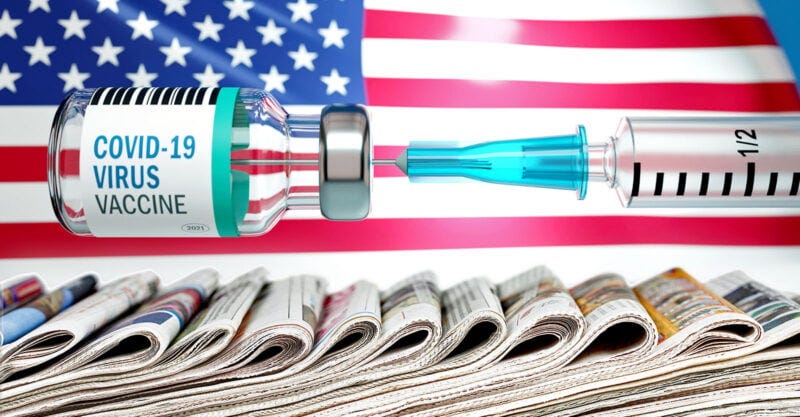Media, Health Officials Lash Out at RFK Jr. Over New COVID Vaccine Recommendations
The normies have officially entered meltdown mode.
This article originally appeared on The Defender and was republished with permission.
Guest post by Brenda Baletti, Ph.D.
After HHS Secretary Robert F. Kennedy Jr. announced the CDC will stop recommending COVID-19 vaccines for healthy children and pregnant women, the media and medical associations attacked the decision as out of line with current thinking. However, the CDC’s vaccine advisory committee was poised to make a similar recommendation next month.
Tuesday’s announcement that the Centers for Disease Control and Prevention (CDC) will no longer recommend COVID-19 vaccines for healthy children and pregnant women ignited a firestorm of criticism from many mainstream public health officials, organizations and doctors.
The new recommendations don’t preclude pregnant women and children from getting the vaccines — the CDC just isn’t recommending them any longer for those groups.
The American College of Obstetricians and Gynecologists (ACOG) said in a statement that the organization is “concerned about and extremely disappointed” by the new recommendations, announced yesterday by U.S. Secretary of Health and Human Services (HHS) Robert F. Kennedy Jr.
“As ob-gyns who treat patients every day, we have seen firsthand how dangerous COVID-19 infection can be during pregnancy and for newborns who depend on maternal antibodies from the vaccine for protection,” said Dr. Steven J. Fleischman, ACOG president.
“It is very clear that COVID-19 infection during pregnancy can be catastrophic and lead to major disability, and it can cause devastating consequences for families. The COVID-19 vaccine is safe during pregnancy, and vaccination can protect our patients and their infants after birth,” he added.
ACOG didn’t cite any evidence for its claims.
The American Academy of Pediatrics said the removal of the vaccines from the schedule “ignores independent medical experts and leaves children at risk.”
The organization, which typically aligns its recommendations with those of the CDC, told MedPage Today that it “may have to rethink how we harmonize with the federal government.”
The New York Times conceded there isn’t scientific evidence to support vaccination among healthy children. However, the Times still called the move “Kennedy’s latest salvo in dismantling decades of vaccine safety policies, especially those intended for children.”
Others criticized the process behind the decision-making. MedPage Today cited a retired pediatrician, who said it was unusual for the HHS secretary to bypass typical agency processes.
STAT News said it was “unprecedented” for the secretary to announce such a change, and cited a law professor who said it might open the decision up to being challenged.
Another expert quoted by MedPage Today, Dr. Tina Tan, said the decision would make it harder to access vaccines because insurers may decide not to maintain coverage for a vaccine not listed on the schedule.
As of today, no changes to the schedule appear on the CDC website.
Advisory committee poised to make similar recommendation anyway
For vaccines to get onto the childhood schedule, typically the CDC Advisory Committee on Immunization Practices (ACIP) recommends them, after which the CDC director approves them.
At least one other vaccine has been taken off the schedule. When Rotashield, Wyeth’s (now Pfizer) rotavirus vaccine, caused intussusception in infants one to two weeks following vaccination, the vaccine was suspended pending ACIP review. ACIP then recommended removing it, and the CDC took it off the schedule in 1999.
However, experts who spoke with The Defender said ACIP is only an advisory committee, and the CDC director — and HHS more generally — aren’t bound by ACIP’s recommendations. They can and sometimes do make independent decisions.
For example, in September 2021, former CDC Director Rochelle Walensky overruled ACIP when she decided to recommend COVID-19 boosters for everyone age 16 and older. ACIP recommended against the boosters, citing the lack of safety and efficacy data on the vaccine for 16- and 17-year-olds.
Several news outlets highlighted the absence of a CDC representative when Kennedy announced the news Tuesday, flanked by the directors of the National Institutes of Health and the U.S. Food and Drug Administration (FDA).
The acting director of the CDC, Susan Monarez, Ph.D., stepped down in March when she was nominated for the permanent director’s position. Kennedy has reported that attorney Matthew Buzzelli is currently acting director, while Monarez awaits U.S. Senate confirmation hearings.
Despite the consternation reported that the process for removing the vaccine is atypical, and not based on public debate, ACIP discussed the issue extensively in its April meeting, and was reportedly poised to make a similar recommendation.
STAT News reported that the ACIP subgroup focused on vaccine recommendations is intending to recommend at their June meeting that the universal vaccination for all people ages 6 months and up be replaced with one that “urges people at high risk of severe illness if they contract Covid to continue to be vaccinated.”
The subgroup made a detailed presentation to ACIP in April, and explored three potential recommendations: keeping the universal recommendation, reducing it to only people at high risk or reducing it to high risk for everyone under age 64.
In April, a poll of ACIP members showed that 76% supported switching to a non-universal recommendation.
The full committee is set to vote on that recommendation next month. It will be up to the CDC whether to accept the recommendation or make a different one.
Last week, the FDA announced plans to limit approvals for updated COVID-19 vaccines to people over age 65 and people with one or more health conditions that put them at high risk for the virus.
The agency also said it will require new clinical trial data to approve new COVID-19 shots for healthy children.
Under the new rules, between 100-200 million Americans would still be eligible for the shots, because so many people have conditions that are considered comorbidities, the FDA said.
Will children and pregnant women lose access to COVID vaccines?
The CDC’s Vaccines for Children Program is a federal program that provides free vaccines to uninsured or underinsured children and children who are eligible for or enrolled in Medicaid.
Medicaid compensates pediatricians for the costs associated with administering the vaccines. It also requires physicians who participate in the program to administer all vaccines on the childhood vaccination schedule to every child.
Attorney Rick Jaffe represents Dr. Samara Cardenas, a California pediatrician who treats children on Medicaid, in a lawsuit funded by Children’s Health Defense. Cardenas sued the CDC because she was kicked out of the Vaccines for Children Program when she refused to give COVID-19 vaccines to healthy kids.
Jaffe told The Defender that if the COVID-19 vaccine is no longer on the CDC schedule, the Vaccines for Children Program would no longer recommend it, and doctors would no longer be compelled to purchase and administer it as part of the program.
However, “there’s a big qualifier,” he said, which is that the recommendation is changing only for healthy children. “According to RFK Jr. and the health authorities, there are a lot of sick kids out there.”
Jaffe said that given the large number of children excluded from the new recommendation, he believes it’s likely the CDC-funded program will still cover the costs of the vaccine for those who want it.
He also said that most insurance carriers will likely still pay for the shot for those who want it. “In general, insurance carriers are pro-vaccine,” he said.
Jaffe said he thought the qualification was a good thing because it meant no one would be compelled to get the shot.
Currently, doctors in the Vaccines for Children Program are being forced to give the shots to little kids “even though it’s only emergency use authorized and never proven to have any clinical benefit.”
That will now change, he said. However, any parent who wants their kid to get the shot will likely be able to do so, because risk factors like allergies are so prevalent.
The Vaccines for Children Program did not respond to The Defender’s inquiry about its plans to cover the vaccine. The top three U.S. health insurance providers — United Healthcare, Kaiser Permanente and Elevance Health (formerly Aetna) — did not respond either.
Will new recommendations have ‘devastating consequences’ for pregnant women?
The Guardian reported that doctors fear “devastating consequences” for pregnant women, citing ACOG’s statements.
The article also quoted a doctor from March of Dimes who said she once cared for an unvaccinated pregnant woman who died from COVID-19, and the Society for Maternal Fetal Medicine, which also said it still recommends the vaccine as safe and effective for pregnant women, but without citing evidence to support the claim.
However, risks to pregnant women have been known — and ignored or hidden by public health agencies and professional organizations — since even before the CDC began recommending pregnant women take the vaccines.
Pfizer clinical trial data showed the shots were linked to miscarriages and preterm births. Pfizer’s pregnancy and lactation report also detailed extensive side effects for nursing babies, including fever, vomiting and edema, or swollen tissue, among many other issues.
Pfizer sent its report to the FDA on April 20, 2021. Three days later, Walensky gave a White House press briefing, during which she told women there was no bad time to get vaccinated — before, during or after pregnancy.
Earlier this month, Dr. Sara Brenner, a preventive medicine physician who has worked at the FDA since 2019, including as itss principal deputy commissioner — and briefly its acting commissioner — admitted she refused the COVID-19 mRNA vaccine while pregnant, even as her agency promoted it as “safe and effective” for all pregnant women.
Brenner explained on May 15 at the “MAHA Institute Round Table” that her decision was driven by a lack of safety data, particularly around the biodistribution of the vaccine’s lipid nanoparticles (LNPs) — the tiny fat particles used to deliver the mRNA into cells.
She warned that unintended toxic effects — especially in vulnerable populations like pregnant women — could not be ignored.
A recent analysis of reports submitted to the Vaccine Adverse Event Reporting System (VAERS) found safety signals for 37 adverse events when COVID-19 vaccines were administered during pregnancy.
Meanwhile, few pregnant women are opting to take the shot. In the 2022-2023 season, only 27.3% of women chose to take the shot. In the 2024-2025 season, only about 14% opted in.
Related articles in The Defender
HHS Will Stop Recommending COVID Vaccines for Kids, Teens and Pregnant Women, WSJ Reports
Study Finds 37 Safety Signals for COVID Vaccines During Pregnancy, CDC Still Urges Women to Get the Shots
Donate to Children’s Health Defense




Look out! The normies are PISSED!